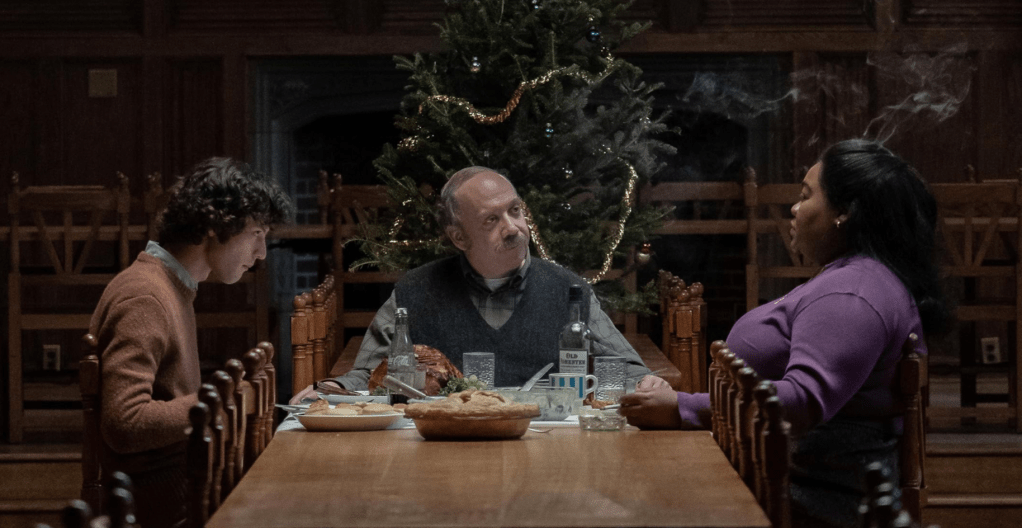Reviewed by Aarushi Kumar, a writer.

Amongst the nominees for the Oscars’s “Best Picture” award, The Holdovers is standout: a refreshing vision amongst its generally high-concept, tragic, and highly upsetting competitors (excluding Barbie, of course). A heartwarming comedy with a 1970s Hollywood feel, it breaks the stereotype that art must inherently be entirely unique, dire, and somewhat unsettling for it to be deserving of critical acclaim and respect.
The first act—highly reminiscent of Peter Weir’s 1989 film Dead Poets Society—introduces us to Barton, an all-boys boarding school in 1970s New England, and our protagonist: Paul Hunham (Paul Giamatti), a tyrannical classics professor. The film begins the day before Christmas break: Mr. Hunham parsimoniously fails the wealthy sons of school donors, and is consequently punished with overseeing the five students staying behind at Barton over the break—the titular “holdovers.” But, in an Oscar Wilde-esque deux ex machina, one of the holdover’s fathers offers to take all five students on a skiing trip. All of the boys thus exit Barton, except for one: intelligent, sarcastic, and exceedingly angsty Angus Tully (Dominic Sessa) who was unable to get parental permission.
Now, the “holdover” group includes only Mr. Hunham, Angus Tully, and Mary Lamb (Da’Vine Joy Randolph), the school’s head cook who stayed over in an attempt to grieve her son, Curtis, who recently died in the Vietnam War. While navigating holiday parties, “academic” field trips, and adventures in Boston, this moody, quarrelsome trio makes for a comedic, crude, yet grounded depiction of grief, tragedy, and the rare moments of joy one can steal in between.
Since the film focuses predominantly on the relationships and interactions between its three main characters, its storytelling success can be attributed principally to its remarkable performances, namely Giamatti’s and Randolph’s.
Mr. Hunham could have easily become a caricature of the strict, tweed-clad academic who believes themselves to be the absolute peak of intellect, but Giamatti gives him life and complexity by separating his academic behavior from his true personality. Hunham is not a grump, he is grumpy in the face of his snotty students; he is not inherently a dictatorial professor, he is a weary, well-practiced teacher who has found the most success in his harsher methods of teaching. Giamatti shines in The Holdovers’s more tender moments: providing comfort and friendship to Mary, giving advice to Angus, and eventually being vulnerable with both of them. It’s Giamatti’s depth and empathy as Mr. Hunham that elevates the movie from feel-good dramedy to an Oscar-worthy exploration of the events that can build and break down an individual’s chronic pessimism.
Randolph is similarly fantastic, giving a nuanced portrait of a grief-stricken mother navigating her despair. Mary is unflinchingly aware of the difficult hand she has been dealt, yet remains a relentlessly hard worker — even staying at the school over Christmas to feed the “holdover” students. Randolph realistically depicts the experience of a Black woman surrounded by those significantly more privileged than her, who (as teenage boys tend to do) often explicitly disrespect her. She continues to illustrate Mary’s sense of grace, empathy, and wit throughout the heart-rending performance—a difficult task, given how heavy and fresh the character’s grief is.
Outside of plot and character, the film also delivers visually: it uses cinematography reminiscent of 1970s Hollywood, and its muted color palette creates a simultaneously weary but comforting atmosphere that the story thrives in. The Holdovers is a grounded, yet comedic film that has the makings of a long-term family classic. It’s a masterclass in cinematic depictions of melancholy, making its sweet, tender moments all the more satisfying. Watch with friends, family, or by yourself—no matter the context, this film is extremely difficult not to love.
